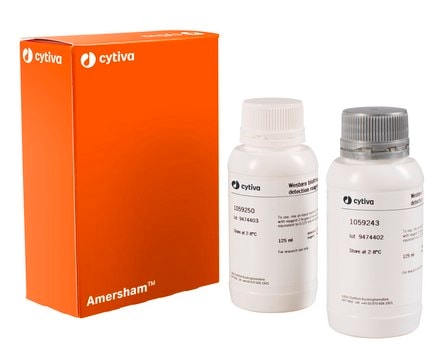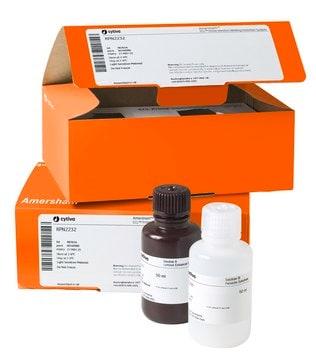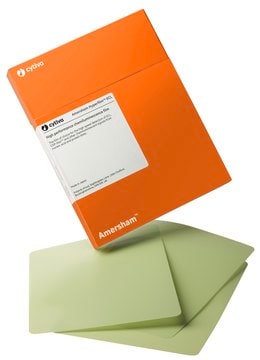GERPN2209
ECL™ Western Blotting Detection Reagents
Cytiva RPN2209
Synonyme(s) :
ECL detection reagents, Western blot reagents
Se connecterpour consulter vos tarifs contractuels et ceux de votre entreprise/organisme
About This Item
Code UNSPSC :
41105332
Nomenclature NACRES :
NA.32
Produits recommandés
Caractéristiques
wetted part: no
Conditionnement
pkg of 1 kit
Fabricant/nom de marque
Cytiva RPN2209
Couleur
Detection reagent 1: Colorless Detection reagent 2: Colorless
Température de stockage
2-8°C
Description générale
Amersham™ ECL™ Western Blotting Detection Reagents were the world′s first commercial chemiluminescent reagents for Western blotting and are still the most widely used. They are at least 10-fold more sensitive than colorimetric assays and produce excellent and reliable results every time.
These reagents use enhanced luminol-based detection which is suitable for all routine western blotting. ECL™ Western Blotting Detection Reagents in combination with Hybond® ECL™ membranes form a complete solution for Western blot applications.
Contents include the following:
GERPN2109, 62.5 mL each of ECL™ Detection Reagents 1 and 2 (1000 cm2)
GERPN2209, 125 mL each (2000 cm2)
GERPN2106, 250 mL each (4000 cm2)
GERPN2134, 375 mL each (6000 cm2)
These reagents use enhanced luminol-based detection which is suitable for all routine western blotting. ECL™ Western Blotting Detection Reagents in combination with Hybond® ECL™ membranes form a complete solution for Western blot applications.
Contents include the following:
GERPN2109, 62.5 mL each of ECL™ Detection Reagents 1 and 2 (1000 cm2)
GERPN2209, 125 mL each (2000 cm2)
GERPN2106, 250 mL each (4000 cm2)
GERPN2134, 375 mL each (6000 cm2)
Emission duration max. 2 h
Application
Western Blotting
Caractéristiques et avantages
- High sensitivity, ~10 pg in model system.
- Proven performance, the most frequently cited ECL™ Western Blotting Detection Reagents in publications
- Detectable on Hyperfilm ECL™ or with CCD imager
- Recommended mebrane Hybond ECL™
Composants
Sufficient for detection of 2000 cm2 of membrane:
125 mL Detection reagent 1(color : colorless)
125 mL Detection reagent 2 (color: colorless)
125 mL Detection reagent 1(color : colorless)
125 mL Detection reagent 2 (color: colorless)
Stockage et stabilité
Please be aware this product may be shipped 90 days before the expiration date. For more information on the batch specific expiration date, please contact technical service.
Remarque sur l'analyse
To view the Certificate of Analysis for this product, please visit www.cytiva.com.
Informations légales
Amersham is a trademark of Cytiva
ECL is a trademark of Cytiva
Hybond is a registered trademark of Cytiva
Code de la classe de stockage
12 - Non Combustible Liquids
Certificats d'analyse (COA)
Recherchez un Certificats d'analyse (COA) en saisissant le numéro de lot du produit. Les numéros de lot figurent sur l'étiquette du produit après les mots "Lot" ou "Batch".
Déjà en possession de ce produit ?
Retrouvez la documentation relative aux produits que vous avez récemment achetés dans la Bibliothèque de documents.
Les clients ont également consulté
Qinmiao Huang et al.
Molecular medicine reports, 16(5), 7086-7091 (2017-09-14)
Lung cancer is reported to be a major public health issue worldwide and the overall prognosis of patients remains poor. The expression levels of Livin and Survivin, of the inhibitors of apoptosis (IAP) family, are associated with prognostic significance in
Hua Zhang et al.
International immunopharmacology, 69, 88-94 (2019-01-28)
Inflammation is fundamental in osteoarthritis (OA) pathogenesis. Semaphorin 4A (Sema4A) has been implicated in immune-associated diseases, however, its role in OA remains unclear. In this study, we show that Sema4A is upregulated in knee OA articular cartilage as well as
Ping Zhou et al.
International journal of biological sciences, 16(2), 204-215 (2020-01-14)
Chronic renal failure (CRF), also known as chronic kidney disease (CKD), is a common renal disorder characterized by gradual kidney dysfunction. Molecular dissection reveals that transforming growth factor beta (TGF-β) plays a central role in the pathogenesis of CRF. However
Gennaro Gambardella et al.
Science advances, 6(39) (2020-09-27)
Cells respond to starvation by shutting down protein synthesis and by activating catabolic processes, including autophagy, to recycle nutrients. This two-pronged response is mediated by the integrated stress response (ISR) through phosphorylation of eIF2α, which represses protein translation, and by
Notre équipe de scientifiques dispose d'une expérience dans tous les secteurs de la recherche, notamment en sciences de la vie, science des matériaux, synthèse chimique, chromatographie, analyse et dans de nombreux autres domaines..
Contacter notre Service technique









